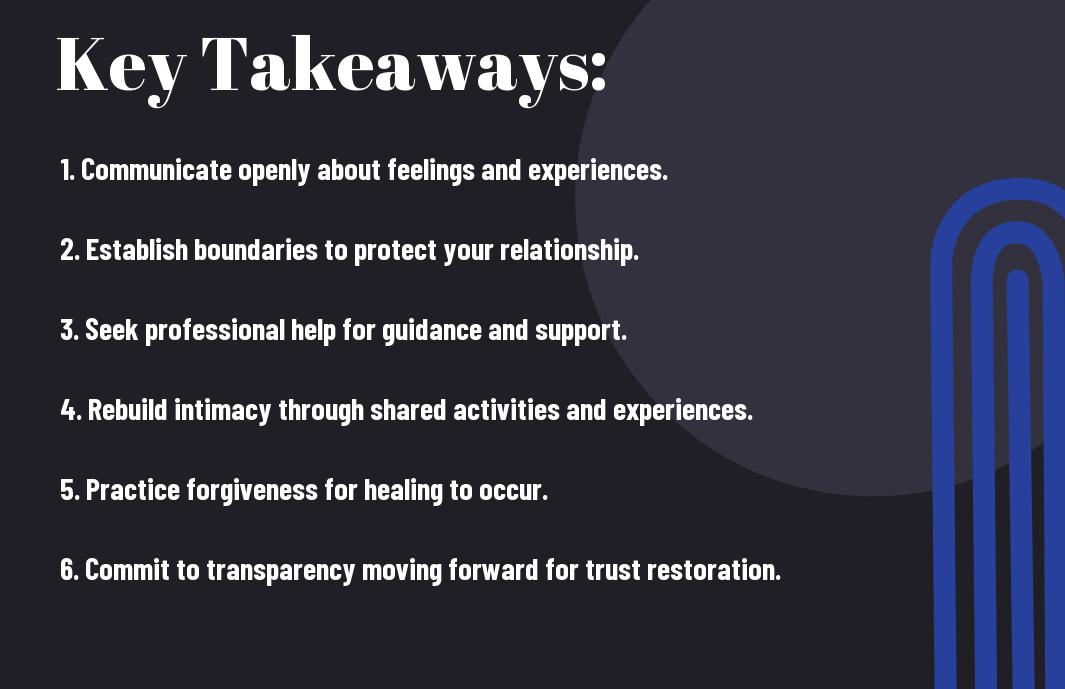Most individuals in a relationship would agree that an emotional affair can feel like a devastating betrayal, impacting trust and love in profound ways. If you find yourself navigating this painful journey, it’s important to understand that recovery is possible through effective communication, honest reflection, and mutual effort. You have the power to rebuild your relationship by prioritizing understanding, acknowledging feelings, and setting boundaries that promote healing. This guide will explore actionable steps that can help you restore the vital connections you once shared.

Key Takeaways:
- Open and honest communication is necessary for both partners to express their feelings and concerns after an emotional affair.
- Establishing boundaries helps to rebuild trust and ensures both partners are on the same page moving forward.
- Engaging in couples therapy can provide professional guidance and support during the recovery process.
- Taking responsibility for actions is important; the partner who engaged in the affair should acknowledge their behavior and its impact.
- Rebuilding intimacy requires patience and a willingness to reconnect emotionally and physically at a comfortable pace.
- Forgiveness is a journey that can take time; both partners should be prepared for the emotional ups and downs that may arise.
- Focus on creating new positive experiences together to strengthen the relationship and build a foundation for a healthier future.


Understanding Emotional Affairs
While emotional affairs may not involve physical intimacy, they can be just as damaging to relationships. This type of infidelity occurs when you form a deep emotional connection with someone outside your committed partnership, often leading to feelings of betrayal and insecurity. Emotional affairs can blur the boundaries of trust, causing you to question the fidelity and commitment of your partner.
Definition and Dynamics
Above all, an emotional affair is characterized by an intimate bond that goes beyond friendship. It typically involves secretive communication, shared personal thoughts, and an emotional investment that overshadows your relationship with your partner. The dynamics of such affairs can be complicated, often leading individuals to seek emotional support outside their committed relationships when they feel dissatisfied or disconnected.
Signs of an Emotional Affair
Affair signs can manifest in various ways, and recognizing them is important for restoring your relationship. You may notice changes in your partner’s behavior, such as increased secrecy, emotional distance, or a sudden shift in their daily routines. They might become more guarded about their phone usage or begin to spend more time away from home without clear explanations.
Affairs that involve emotional connections can exhibit specific warning signs. You might observe your partner’s increased reliance on someone else for emotional support or a marked decline in intimacy with you. Look for changes in communication patterns, such as withholding affection or minimizing quality time together. Additionally, if they exhibit a sudden interest in new hobbies or friendships that exclude you, it may indicate an emotional investment elsewhere. Recognizing these signs early can empower you to address the underlying issues in your relationship.
The Impact of Emotional Affairs on Relationships
The impact of emotional affairs on relationships can be profound and lasting. They often lead to a significant erosion of trust and intimacy between partners. If you’ve found yourself grappling with the aftermath of such an experience, it is vital to seek guidance on how to rebuild trust after emotional cheating. Through open dialogue and healing strategies, couples can work toward restoration and a renewed sense of connection.
Emotional Consequences
Above all, emotional affairs can leave deep psychological marks that influence how you view yourself and your partner. Feelings of betrayal, sadness, and insecurity may arise, giving way to a cycle of anxiety and mistrust. Acknowledging these emotions is the first step toward healing, allowing both partners to process their feelings honestly and empathetically.
Trust and Communication Breakdown
Emotional affairs often result in a significant breakdown of trust and communication within a relationship. You may feel betrayed, and your partner may struggle to openly communicate their feelings or intentions moving forward. This lack of dialogue can lead to misunderstandings and further conflict, making it challenging to navigate the relationship’s future. Reestablishing communication is vital, as it creates a space for honesty and vulnerability. When you and your partner begin to share your emotions candidly, it can pave the way for rebuilding trust and affecting a healthier connection.
Relationships faced with emotional infidelity require a switch in the way you communicate with each other. It’s important to address not only the actions that led to betrayal but also the underlying feelings and unmet needs that created the emotional disconnect. Focusing on rebuilding communication can allow you to express your feelings without fear of judgment. This embrace of openness not only fosters forgiveness but also can make your bond stronger than it was before, as both partners take accountability and strive for a deeper understanding of each other.
Steps to Recovery
After an emotional affair, the path to healing begins with both partners committing to the recovery process. This involves acknowledging the hurt caused, fostering open communication, and rebuilding trust through consistent actions. As you engage in this journey, be prepared for ups and downs, but prioritize working together toward a healthier relationship.
Acknowledging the Affair
Along with confronting the reality of the emotional affair, you must both accept its impact on your relationship. This means understanding not only the betrayal itself but also the feelings it has evoked in you and your partner. Taking this step is crucial in facilitating honest dialogue and repairing the connection.
Open Communication Strategies
Among the foundational steps in recovery is the establishment of open communication strategies. This entails fostering a safe space where both partners can express their feelings, fears, and expectations without judgment. Engaging in active listening and validating each other’s emotions can set the stage for deeper understanding and healing.
Understanding effective communication is vital in overcoming the aftermath of an emotional affair. You should prioritize active listening, which means giving your partner your full attention and acknowledging their perspectives. Sharing feelings honestly while refraining from blame will create a supportive environment. It’s also helpful to schedule regular check-ins to discuss any lingering concerns or emotions. By committing to these strategies, you will not only address the immediate issues but also cultivate a healthier, more resilient relationship moving forward.
Rebuilding Trust
Not every relationship can survive an emotional affair, but for those who truly want to restore trust and love, it requires commitment from both partners. You must be willing to engage in open communication, be patient, and consistently show that your intentions are genuine. Rebuilding trust is a gradual process that takes time, yet it can ultimately strengthen your bond if approached with care and understanding.
Establishing Transparency
By being open about your feelings, experiences, and daily activities, you create a sense of security that helps both partners to heal. Transparency fosters a safe environment where trust can slowly rebuild, allowing you to navigate the complexities of your relationship with honesty.
Setting Boundaries
Between you and your partner, establishing clear boundaries is vital for maintaining a healthy relationship post-affair. This includes discussing what is acceptable and unacceptable behavior, ensuring both of you feel secure and respected as you move forward together.
For instance, you might want to decide on who you communicate with, especially regarding friends from your past who could potentially threaten your relationship. Limit interactions that could lead to misunderstandings or old wounds reopening. Having these boundaries in place helps create a strong foundation, allowing both you and your partner to feel safe and valued as you work through the healing process together.
Restoring Love and Intimacy
For a relationship to flourish after an emotional affair, it is crucial to restore love and intimacy. This involves creating a safe space where both partners can express their feelings, rebuild trust, and explore the depths of their connection. A committed effort towards vulnerability and understanding will pave the way for a rekindled relationship that deepens your bond and enhances mutual satisfaction.
Reconnecting on an Emotional Level
Level with your partner about your feelings, fears, and desires. Engaging in open and honest communication can help you both explore unaddressed issues in your relationship. Take the time to listen actively and empathize with each other’s emotions, creating a stronger support system that encourages vulnerability and honesty.
Reestablishing Physical Connection
Level of intimacy often reflects the health of your overall relationship. Begin by engaging in small physical gestures such as holding hands, hugging, or cuddling to rebuild comfort and warmth. As you both become more at ease, explore ways to enhance your physical presence together, ensuring you prioritize each other’s comfort and desires during this journey.
Connection is a vital aspect of healing after an emotional affair. You should approach this phase with patience and a willingness to communicate openly about your needs and boundaries. Start with non-sexual intimacy, such as cuddling or affectionate touches, which can lead to more passionate interactions. Make it a priority to create a relaxed environment where both partners feel secure and appreciated. This gradual process not only enhances physical attraction but also strengthens your emotional bond, ensuring a holistic approach to restoration in your relationship.
Seeking Professional Help
Many couples facing the aftermath of an emotional affair may find that seeking professional help is a vital step towards healing. A therapist can provide a safe environment for both partners to express their feelings, explore underlying issues, and develop effective communication strategies. This guidance is necessary as you work together to rebuild trust and intimacy in your relationship.
When to Consider Counseling
The decision to pursue counseling can arise when you notice persistent feelings of hurt, anger, or distrust following the affair. If attempts to discuss these emotions with your partner lead to constant arguments or unresolved conflict, it’s an indication that professional assistance may be necessary to facilitate a constructive dialogue and promote healing.
Benefits of Therapy
Any therapeutic support can significantly improve your relationship. A professional therapist can help you both understand the dynamics of your relationship, increase emotional awareness, and develop effective coping strategies. Therapy offers a structured setting to address feelings of betrayal and confusion, paving the way for meaningful conversations that foster understanding and empathy.
Benefits of therapy extend beyond immediate support; it equips you with tools to navigate future challenges effectively. Engaging with a therapist can lead to enhanced communication skills and deeper emotional intimacy. Furthermore, it fosters a sense of accountability for your actions and can enhance overall relationship satisfaction. By addressing unresolved emotions together, therapy cultivates a shared understanding that empowers both partners to heal and move forward positively.
Final Words
Conclusively, navigating the path to recovery from an emotional affair requires commitment and open communication from both partners. You must prioritize honesty and transparency to rebuild trust, while actively working to understand each other’s feelings and needs. Engage in meaningful conversations to address the underlying issues that contributed to the affair, and take time to reconnect emotionally and physically. By fostering empathy and patience, you can create a stronger bond and restore the love that once flourished in your relationship.
FAQ
Q: What are the initial steps to take after discovering an emotional affair?
A: Discovering an emotional affair can be overwhelming. The initial steps involve creating a safe space for open communication. Set aside uninterrupted time to discuss feelings, clarify what happened, and express the impact on both partners. It’s imperative to listen actively and validate emotions without jumping to conclusions or blaming. Seeking assistance from a qualified therapist may also be beneficial to navigate these difficult conversations.
Q: How can couples effectively rebuild trust after an emotional affair?
A: Rebuilding trust requires consistent effort and transparency from both partners. The partner who strayed should demonstrate accountability and willingness to answer questions openly. Maintaining honesty about feelings and fostering regular communication can help. Setting boundaries to prevent future issues and committing to a shared goal of healing together will also aid in the restoration of trust.
Q: What role does therapy play in the recovery process from an emotional affair?
A: Therapy can be a vital component in recovering from an emotional affair. A trained therapist can guide couples through the complexities of their emotions, facilitating productive conversations and helping to identify underlying issues. Therapy provides a supportive environment to explore feelings of betrayal, loss, and anger, while also assisting in the development of healthier communication and coping strategies, ultimately promoting healing and understanding.
Q: How can individuals manage their emotions during the healing process?
A: Managing emotions during recovery is important and can be achieved through several strategies. Engaging in self-care activities such as journaling, exercising, or pursuing hobbies can help express and process feelings. Practicing mindfulness and meditation can also support emotional regulation. It may be effective to set aside specific times to discuss feelings, preventing emotions from becoming overwhelming during daily interactions.
Q: What are the signs that a couple is making progress in their recovery journey?
A: Progress in recovery can often be measured by improved communication and emotional intimacy. Couples may start to feel more comfortable discussing their feelings and showing vulnerability. Other signs include a renewed sense of partnership, a commitment to shared goals, and a willingness to engage in activities together. Small positive changes in trust, like being more open and transparent, can also indicate healing is taking place.
